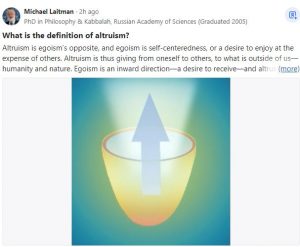
Altruism is egoism’s opposite, and egoism is self-centeredness, or a desire to enjoy at the expense of others.
Altruism is thus giving from oneself to others, to what is outside of us—humanity and nature.
Egoism is an inward direction—a desire to receive—and altruism is an outward direction—a desire to give.
After the definition of altruism arises the question: How can human beings become genuinely altruistic?
Becoming altruistic requires participating in a supportive social and learning environment where we can learn how nature operates altruistically, and practice how to think and act similarly to nature, together with others.
Genuine implementation of altruistic attitudes in a certain environment awakens forces dwelling in nature that can instill in us an altruistic perception and sensation of reality. That is, by regularly influencing one another in a certain social setup with the greatness and importance of altruism—how it is a nature-based quality, and how our becoming altruistic can solve all of our problems and lead us to much happier and more secure lives—we can then invert ourselves from being naturally egoistic, to acquiring a second altruistic nature.
We would then become beings with outwardly-aimed thoughts, desires, actions, intentions and goals—opposite to our current inwardly-aimed egoistic operating system.
Preceding participation in an egoistic-to-altruistic transformation process is a conclusion that more and more of humanity is reaching: the understanding of our egoistic nature leading to no positive outcomes, and the realization of the need for a shift to altruism, that altruistic forces that could grant us secure our survival, and even more so, invigorate, energize and enhance our lives.
Featured in Quora